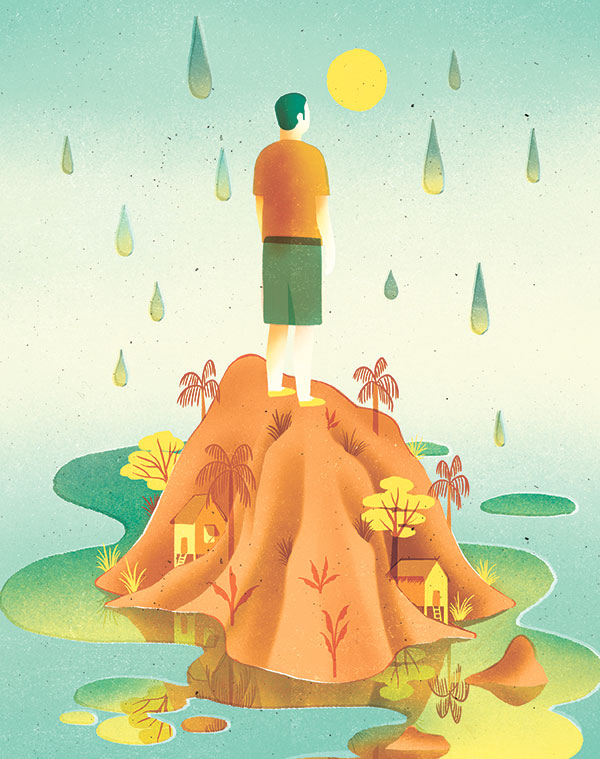The Filipino birds
By Denver Ejem Torres
“As a man himself sows, so he himself reaps; no man inherits the good or evil act of another man. The fruit is of the same quality as the action.” – Mahabharata, xii.291.22
FEW minutes before we met a minor road accident on our way to Ubud, I saw two birds which looked like our church maya. The two birds reminded me of Singapore. These Ubud birds were feeding in the roadside and were surprisingly, at least to me, seemed to be unworried and very self-assured that no one and nothing would harm them.

Last year in Singapore, where I spent my 32nd birthday, I was impressed and surprised by the fascinating confidence of the Singaporean birds. In Tiong Bahru, on my way to the bookstore called BooksActually, I happened upon two Blackbirds. I found them curious for they did not behave like our birds — the birds we have in the Philippines. They did not stir at all when I walked past them despite the fact that my feet were literally less than a foot from them. They seemed confident that I wasn’t going to harm them. This was the case of all my avian encounters wherever I went in Singapore.
There was of course a perfect reason I found that behavior of the Singaporean birds strange. It wasn’t them. It was me. I wasn’t accustomed to such bird conduct. In the Philippines, I grew up with birds and birdsong. But the birds here are usually out of sight. When they reveal themselves, they are either up in the air or perching on a high branch. On rare occasions when they are on land, in search for food, a slight stir, as in the mere presence of a human, would trigger them to flee. As if indeed to the avian mind or eye, humans mean danger. Humans are the enemy.
Our birds are psychologically broken. Their DNA carries the code of trauma. Their consciousness is perpetually haunted by a big tirador. The slingshot is the ghost that haunts them, always. Their minds have evolved to survive the slingshot.
Here, I insist on calling birds with nationality because like us humans, I believe that birds too act and think idiosyncratically. Thus, this reality, in my thinking, qualifies them to acquire a citizenship of sorts.
As postulated by Darwin, species develop into a unique kind, because of the kind of environment they inhabit. This, also extends, I believe to their imagination, and therefore to their attitude towards the other members of their milieu — and not only to their physical features and feeding capacity.
I imagine that after a long period of time, our birds would have developed a characteristic fear or panic that is unique and therefore distinctive and different from the other birds around the world. As a case in point, take the Singaporean and Balinese birds vis a vis our birds.
I told Mr. Ketut Suwardana, our Balinese driver, that the Singaporean and Balinese birds are luckier than the Filipino birds because they belong to an environment that does not abuse or kill them or view them as meals.
Ketut, the owner of the villa we rented through Airbnb, who picked us up in Kuta and drove my friend and I to Ubud, without hesitation, readily agreed to my observations. He said: Hamsa! And the Hindu believes in karma.
In Hinduism, which is a predominant religion in Bali, the hamsa (Sanskrit for aquatic birds such as goose or swan), is often identified with the Supreme Spirit or Brahman. In other words, birds hold a special place in the Balinese imagination. I look at my past with a little shame. I remember when I was a kid, I would pass by a group of gansa (Bisaya for goose) on my way to my grandparents’ house in Bitan-ag. I’d come up to them like a bully and intentionally chase them so they would squawk like crazy. As a kid, I found it delightful to see them frightened.
Aside from karma, the Hindu is in constant pursuit of dharma which means, in simple terms, living the right way, and acting out duties, virtues, rights, laws and conduct in accordance to what makes the cosmos stay as it is, in order.
For a moment, I thought of our disorderly affairs, our disasters and calamities back home. I wondered for a second whether they happened (or are happening) to us because of how we treat each other (each other, in Hindu philosophy includes all). I wondered if we were Hindu-Balinese in our dealings with each other, with our environment, would typhoons choose other paths and dissipate in seas instead of over our roofs?
When we arrived at the resort, I felt lucky to have survived that accident. That accident could have turned into a serious one and could have claimed our lives. But it did not. When I asked Ketut what happened and why he did not report it to the police like what we usually do in the Philippines, he replied: It’s all part of karma. He did not expound. I stopped asking questions. I was content with the instinctive feeling that we were saved by good karma.
Karma is such a practical principle. It allows one to see the world with care and gratitude and encourage one to have an infinite understanding of the things around him, whether it talks or chirps. I told myself, while waiting to be checked in, that it wouldn’t be bad at all if I add a little Hindu to my ambivalent, Christian self.
Namaste.
***
Denver Ejem Torres turned 33 this year. He was lucky to celebrate his birthday in Bali, a beautiful and special island. In Bali, he also had the chance to do some finishing touches to his poetry manuscript called Hate-eating birds.



